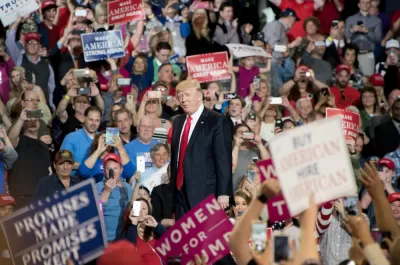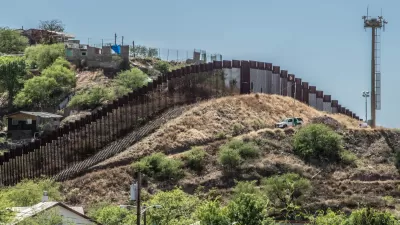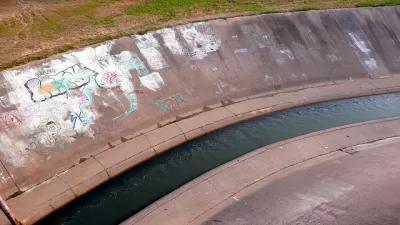Details about what the federal infrastructure plan would spend money, or where it would get the money to spend, have yet to be revealed.

"Democratic congressional leaders emerged from a meeting at the White House on Tuesday and announced that President Trump had agreed to pursue a $2 trillion infrastructure plan to upgrade the nation’s highways, railroads, bridges and broadband," reports Annie Karni and Alan Rappeport.
The next date to watch as this infrastructure plan develops is three weeks from now, when the trip will meet again, and President Trump is "expected to tell them how he planned to actually pay for the ambitious project."
As noted in the article, the president named big promises about infrastructure spending during the presidential campaign of 2016, but the phrase "Infrastructure Week" has turned into a punch line as the administration has failed to make any progress on the issue in its first two years in office. A plan proposed at the beginning of 2018 died quickly in Congress.
The article places the infrastructure meeting in context of the very complicated politics surrounding the president, and also discusses the consequences of Democrats trying again on infrastructure in the wake of the Mueller Report and ongoing work by the Trump administration to roll back environmental regulations.
FULL STORY: rump and Democrats Agree to Pursue $2 Trillion Infrastructure Plan

Planetizen Federal Action Tracker
A weekly monitor of how Trump’s orders and actions are impacting planners and planning in America.

Restaurant Patios Were a Pandemic Win — Why Were They so Hard to Keep?
Social distancing requirements and changes in travel patterns prompted cities to pilot new uses for street and sidewalk space. Then it got complicated.

Map: Where Senate Republicans Want to Sell Your Public Lands
For public land advocates, the Senate Republicans’ proposal to sell millions of acres of public land in the West is “the biggest fight of their careers.”

Maui's Vacation Rental Debate Turns Ugly
Verbal attacks, misinformation campaigns and fistfights plague a high-stakes debate to convert thousands of vacation rentals into long-term housing.

San Francisco Suspends Traffic Calming Amidst Record Deaths
Citing “a challenging fiscal landscape,” the city will cease the program on the heels of 42 traffic deaths, including 24 pedestrians.

California Homeless Arrests, Citations Spike After Ruling
An investigation reveals that anti-homeless actions increased up to 500% after Grants Pass v. Johnson — even in cities claiming no policy change.
Urban Design for Planners 1: Software Tools
This six-course series explores essential urban design concepts using open source software and equips planners with the tools they need to participate fully in the urban design process.
Planning for Universal Design
Learn the tools for implementing Universal Design in planning regulations.
Heyer Gruel & Associates PA
JM Goldson LLC
Custer County Colorado
City of Camden Redevelopment Agency
City of Astoria
Transportation Research & Education Center (TREC) at Portland State University
Camden Redevelopment Agency
City of Claremont
Municipality of Princeton (NJ)





























